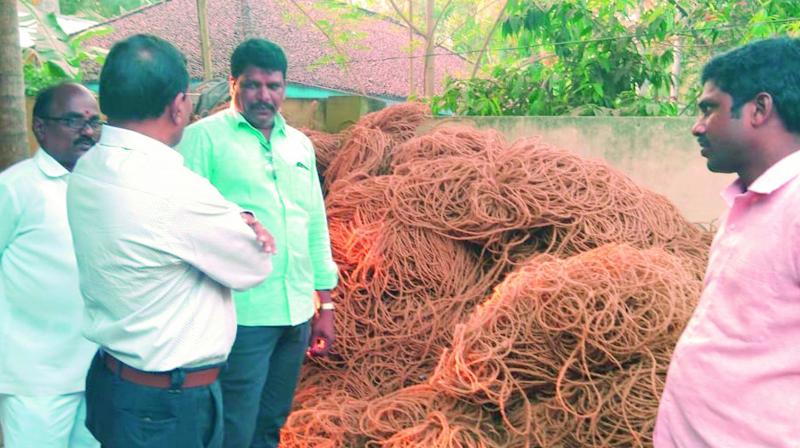Rajahmundry: Use latest tech, farmers told
Coconut farmers to be trained to use modern machines, boost their income.;

Rajahmundry: Given the huge demand for products made of coconut husk, fibre and the dust, both in the domestic and international markets, horticulture authorities intend to train coconut farmers to avail latest technology by using modern machinery to produce quality products in the Konaseema region in East Godavari shortly.
Coconut plantations are being raised over about 51,000 hectares involving nearly 70,000 farmers, mainly in the Konaseema region in the district. On an average, about 14,000 coconuts are being produced per acre in a year in the region. Given such a huge quantum of production of coconuts, horticulture authorities have come up with a plan to help farmers produce several products.
Farmers can use coconut husk to make yarn, coconut fibre to make floor/door mats, mattresses, geotextiles to control soil erosion at irrigation canals and coconut dust to make toys.
Horticulture authorities say that yarn made from coconut husk by using high-end technology on a sophisticated machine, has huge demand, mainly from the construction industry in Mumbai and other places for the reason that the coconut yarn is used to fix wooden poles for scaffolding during construction of buildings so that labourers can move men and material and also stand on such structures to construct walls, plaster walls with cement, give a coat of paint and do any other work by standing on high rise structures firmly fixed with coconut fibre yarn.
The yarn can also be used to make bundles of any products and firmly fix them up for safe transport. Coconut fibre can be used for making mats, mattresses and other products.
A fine variety of fibre is in huge demand from top brand companies all over the country to make mattresses.
The fibre can also be used for making geotextiles to stop soil erosion in some minor irrigation projects while coconut dust can be used to make wood which in turn can be used to make toys, TV stands, book shelves, tables and others.
Horticulture authorities say that a minimum of 100 farmers with similar interests can form into a farmer-producer-organisation and register it under the provisions of the Andhra Pradesh Mutually Aided Co-operative Societies Act, 1955 and also under the Companies Act, 2013, so that it helps such FPOs to mobilise nearly 25 per cent of money out of the total estimated cost of the project while the remaining 75 per cent will be given in the form of subsidy by state government.
Once an FPO is formed, commercial banks too come forward to lend money to install modern machinery to start production of products having high demand in the market.
Amalapuram horticulture assistant director Ch. Srinivasulu said, “We are motivating coconut farmers to form FPOs so that they can avail government subsidy to purchase modern machinery and use high-end technology to produce various products from raw material of coconuts and sell them even in the global market. This helps them earn good income.”

